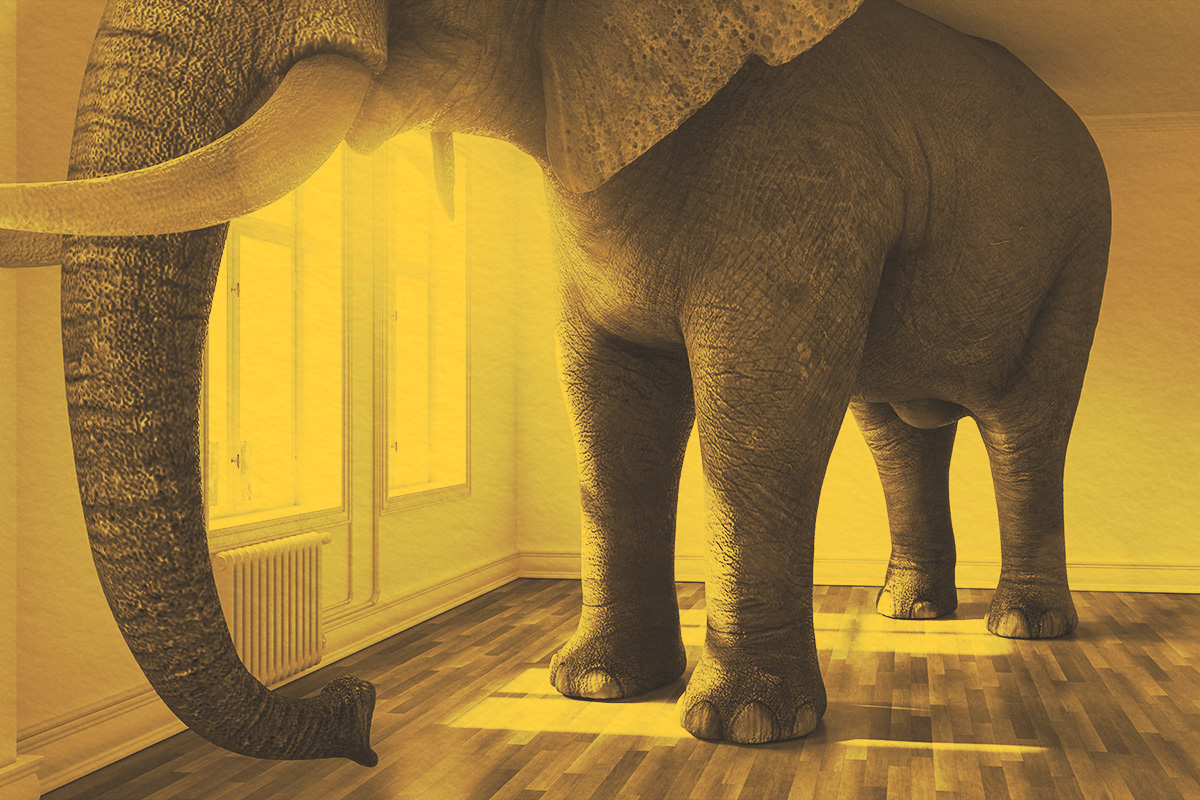Why do we call it "the elephant in the room"? | | Why is an elephant used for the metaphor about ignoring tough subjects, and not a gargantuan whale or a burrowing groundhog? There's a story behind the phrase. | |  | Bennett Kleinman |
|
| |  | | I f there's an elephant in the room, then one of two things is true: Either you're speaking metaphorically, or there's been a breakout at the local zoo. Let's hope it's the former, or else you'll need a lot of peanuts to keep your new animal friend happy.
If we turn to the expertise of the Oxford English Dictionary, the phrase "elephant in the room" has two definitions: The earlier usage dates to 1935, and refers to something "obvious and incongruous." But today, it'd be more popular to use the elephantine saying in the context of a "significant problem or controversial issue which is obviously present but ignored … usually because it is more comfortable to do so." This latter definition appeared in print in 1984 as the title of a book to help guide the children of alcoholics.
While it clearly entered the English lexicon in the 20th century, the phrase was possibly inspired by a 19th-century Russian fable that pokes fun at a man who failed to notice a large elephant in a museum, despite how obvious the creature was. Why an elephant and not another animal? It likely has to do with the fact that elephants are the largest land animal, and are an apt metaphor to use when describing a potentially substantial impact.
Today, people are prone to use this phrase when discussing — or ignoring — tense topics that could cause awkward situations. This may include financial issues, substance abuse, relationship troubles, or any other serious matter. The phrase is rarely, if ever, used in the actual context of there being an elephant nearby. |
| | Continue reading | |  |
| |
| | Thanks for supporting our sponsors! They help keep Word Smarts free for everyone. | |
Emoji Decoded | |  | | Skunk | | | Meaning: Depicts a skunk, known for its distinctive black and white fur and odoriferous defensive spray mechanism.
Evolution: While there may be cause to use the 🦨 for literal wildlife, this emoji is most often used metaphorically to describe unpleasant situations or stinky circumstances.
Usage: [Comment on bad news:] That situation really 🦨 but we'll get through it |
|
 | | Skunk | | | Meaning: Depicts a skunk, known for its distinctive black and white fur and odoriferous defensive spray mechanism.
Evolution: While there may be cause to use the 🦨 for literal wildlife, this emoji is most often used metaphorically to describe unpleasant situations or stinky circumstances.
Usage: [Comment on bad news:] That situation really 🦨 but we'll get through it |
|
| |
Have you read? | |  | | Charlie Hustle | | By Keith O'Brien | | My dad is a big sports guy, and every time Pete Rose is mentioned, he laments the fact that Rose was excluded from the Baseball Hall of Fame (for a gambling scandal). I gave this to my dad for Christmas, hoping it will give him the vindication of shared beliefs. Reviews praise the book for engaging writing and thorough research, while avoiding bias about Rose's controversial legacy. So maybe I'll still have to hear about how Rose was robbed for another year. | | | | Jennifer A. Freeman, Word Smarts Senior Editor | | | | We independently evaluate all recommended products and services. If you click on links we provide, we may receive compensation. |
|
 | | Charlie Hustle | | By Keith O'Brien | | My dad is a big sports guy, and every time Pete Rose is mentioned, he laments the fact that Rose was excluded from the Baseball Hall of Fame (for a gambling scandal). I gave this to my dad for Christmas, hoping it will give him the vindication of shared beliefs. Reviews praise the book for engaging writing and thorough research, while avoiding bias about Rose's controversial legacy. So maybe I'll still have to hear about how Rose was robbed for another year. | | | | Jennifer A. Freeman, Word Smarts Senior Editor | | | | We independently evaluate all recommended products and services. If you click on links we provide, we may receive compensation. |
|
| |
|


0 comments:
Post a Comment